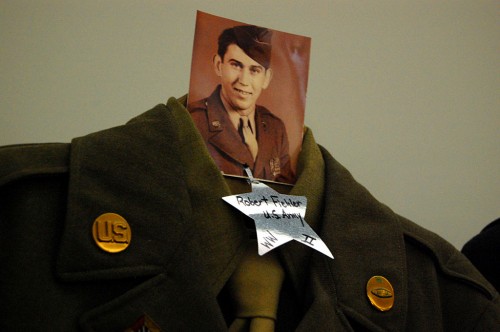 I was spending some more time up at the Altenburg Lutheran Heritage Center and Museum this week interviewing some folks for an exhibit and book I’m working on. The museum volunteers were scurrying around getting ready for their annual Christmas Tree display, so I prowled around looking at other exhibits. My eye was drawn to a set of uniforms worn by servicemen from the Altenburg and Frohna region. It looked perfect for a Veterans Day post.
I was spending some more time up at the Altenburg Lutheran Heritage Center and Museum this week interviewing some folks for an exhibit and book I’m working on. The museum volunteers were scurrying around getting ready for their annual Christmas Tree display, so I prowled around looking at other exhibits. My eye was drawn to a set of uniforms worn by servicemen from the Altenburg and Frohna region. It looked perfect for a Veterans Day post.
I thought one of the men looked familiar. It turned out he was Robert Fiehler, who died Nov. 10, 2009, not long after I had spent some time talking with him in the museum. A nice guy. I photographed Mrs. Fiehler setting up the Christmas tree exhibit last year. (She’s in the first photo on the page.) His son, Gerard, has been my guide to area landmarks and people.
“Hell, SOMEBODY’S got to go”
Gerard has a lot of Bob’s mannerisms and gestures. It’s easy to see the father in the son. Gerard said, “I remember when Dad found out he wasn’t going to make it much longer, he said, ‘Us World War II guys are going at 1,500 a day. Hell, SOMEBODY’S got to go.'”
Gerard said his dad was the last of the World War II vets from the area to have served in Germany; the other survivors – and he thought there might only be three – had been in the Pacific.
Good German names
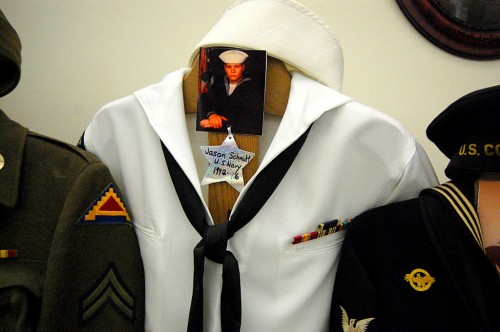 The East Perry County boys who went off to serve had good German names like Fiehler, Schlichting, Gerler, Schmidt and and Petzoldt.
The East Perry County boys who went off to serve had good German names like Fiehler, Schlichting, Gerler, Schmidt and and Petzoldt.
The Cape Girardeau and Perry County German-Americans went off to defend a country that didn’t take kindly to their heritage. During World War I, many of the churches stopped having services in German and families spoke the language only at home because of anti-German sentiments.
The Deutscher Volkfreund, a German-language newspaper in Jackson, which eventually became The Jackson Pioneer, was forced to switch to English when a mob gathered at the office and threatened to destroy all the German type. (The Pioneer hired me as a reporter / photographer /engraver / all-around flunky when I was a junior in high school. I wasn’t hired for my German surname; I was hired because I’d work cheap and was a Barry Goldwater Republican.)
Altenburg Militia: “Better bring your lunch”
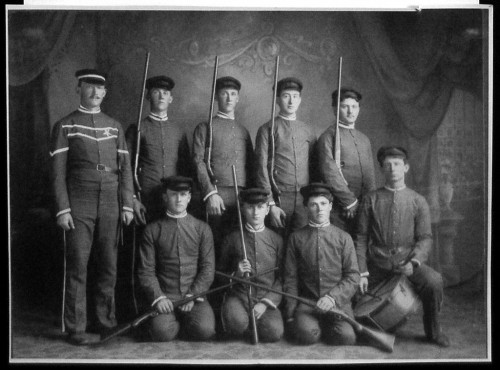 The men of Altenburg, hearing of mobs burning German books in churches and schools in the area, formed the Altenburg Militia. When the word came that the community was going to be attacked, they responded, “You better bring a lunch, because it’s going to take all day.” The attack never came.
The men of Altenburg, hearing of mobs burning German books in churches and schools in the area, formed the Altenburg Militia. When the word came that the community was going to be attacked, they responded, “You better bring a lunch, because it’s going to take all day.” The attack never came.
Photo Gallery of Service Uniforms
Click on any photo to make it larger, then click on the left or right side to move through the gallery. This exhibit moved me much more than a lot of similar displays. Maybe because I actually knew one of the men whose uniform I was looking at or it might have been the pairing of the actual uniform with a photo of the man who wore it. Take a few minutes to thank a veteran for his or her service.
Here’s a link to my post from last Veterans Day.



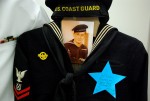

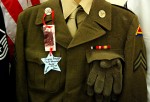


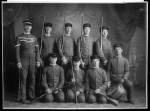
Thanks for this post. First and foremost, it honors our nation’s veterans. And second, it gives our museum in Altenburg a plug. It may be helpful to note that the Altenburg militia picture refers to events that took place around the time of WWI.
German-American, Perry County men and women have served their country since their immigration. From famous fighter pilot, Ray Littge; Air Force Master Sergeant Petzoldt; Marine sharp shooter, Barney Schlichting; Air Force officer, Fran Scholl, to my dear friend and Purple Heart recepient, Bob Fiehler, they served us well. As an active duty Air Force mom–Staff Sergeant Beau Jordan–I want to thank Ken for highlighting our museum exhibit on this special day.
My mother’s family moved from Wittenburg to Cape Girardeau when mother was about 13 years old. She had just completed 8th grade. When they reached Cape, she did not continue in school because of the way she was treated as a result of her German accent. Her younger brother and sister did attend school, but she often talked about how they were treated. I had heard stories regarding the Altenburg Militia. Knowing first hand that German stubbornness they would have won!!
Thanks, Ken for another great article. I hope people will follow your plugs for the museum and venture up to explore it. It is really a snapshot into a great area of the region.
Phyllis, what was your family name? Did you also live in Wittenberg?
Interesting about the Altenberg militia. Got further reading on that one?
My father’s family started switching from German to English as soon as the oldest of Dad’s brothers started going to school, a few years after WWI. Evenings he taught English at the supper table. I’ve heard stories about how that sort of thing changes the parent-child relationship — kids rule! — but haven’t heard anything unpleasant about how it worked out in this case.
My father-in-law remembered how during WWI he’d be given a hard time in school over his German way of talking, but I don’t think it had any lasting traumatic effects. I never heard a syllable of German spoken by anyone in that family.
While I’ve heard lots of stories about the trouble caused for German-speaking people during wartime, I never before heard of anything remotely like the Altenberg militia.
John,
We enticed you to ride your bike from Michigan to New Madrid with some of our earlier posts. Maybe you should do a repeat visit to SE Mo.
I promise you that you’ll find lots of fascinating prowling in the Cape County Trail of Tears area and the German settlements of Eastern Perry County.
The Militia incident occurred during World War I. I’ve seen several stories in the local papers detailing the anti-German sentiments during that era.
The German-Americans weren’t rounded up into intern camps like Japanese-Americans in World War II, but that was probably because there was less ethnic bias against Germans by the 40s.
One of the museum folks who frequent this blog might be able to point you toward some reference material on the matter.
Robert Fiehler was an excellent story teller. His story on the militia is on page 105 of the Altenburg book. The stories were good, but it was his delivery and cadence that made them, I really miss him.
Looking forward to your new book Ken.
Just yesterday I read a couple of chapters about this phase of our country’s history, in “Norwegian Americans and the Politics of Dissent 1880-1924” by Lowell J Soike. I knew that historians often speak of the time leading up to WWI as one of growing conformity, but I had never before read such a detailed description of the politics of the language issue.
Iowa had a governor at the time who was especially extreme, though he had lots of support. He issued an edict forbidding the use of languages other than English in schools and churches. He gave ground a little bit, at least for the Norwegians (the Germans had it worse) but only if the church groups applied for the governor’s permission whenever they wanted to use another language.
A cartoon from a Des Moines newspaper is reprinted in the book, with two frames. Frame one says “How much longer are we going to use mouse traps” (to catch the ugly beast labelled as the disloyal press). Frame 2 says “Instead of one of these (labelled “Immediate suppression.”)
Minnesota to the north wasn’t quite as extreme, but there was still great pressure on the ethnic churches to give up their language. The book doesn’t have anything about the specific situation in Missouri. Maybe Missouri doesn’t have a lot of Norwegians.
You know the phrase, “sticks and stones may break my bones, etc?” Myra now tells me that it wasn’t just a case of kids taunting her father for the use of German. They’d throw sticks and stones when German kids would come to town. (This was in central Iowa.)
So, yes, there might be a few upcoming bike rides on this topic.
But for church history, I’m thinking of making a pilgrimage next spring to Kentucky the site of the Cane Ridge Revival of 1801. When I started the Spokesrider project I just couldn’t make myself get interested in the church history of the settlers. Now I’m starting to find it fascinating. If I keep at it, I may even get interested enough in the Lutherans at Altenberg. It doesn’t hurt that our drive through on the way home in October 2010 showed it to be pretty country. (Not quite full disclosure: My wife and I are Lutheran, and we come from German Lutherans on all sides of our families. I find it easy to overdose on German Lutherans.)
My Mother’s side of the family, The Heimbachs came to Houston, Illinois in the 1850s from the village of Heimbach Germany near Weisbaden. Because of the WWI feelings toward Germans, my greatfather changed his name to Heimbaugh, which has a more English sound to it. Of the four brothers, two changed their names to Heimbaugh and two kept the Heimbach. All Heimbachs and Heimbaugh who grew up in Cape County are related. Uncle Homer Heimbach served in World War I and was gassed and disabled. Two Heimbaughs, John and Walter served in World War II.
My grandfather died in 1958, he could speak German but had no accent. I asked him to teach me German and he refused. He said in his way “you are American and you will speak American”. I have often thought of the value of learning German but took four years of Spanish in high school and college.
I got a tour of the Altenburg museum from Robert Fiehler when he was still alive.. After that I felt like I was his good friend. So glad I got to meet him..